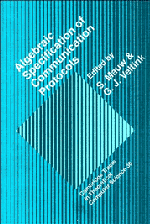Book contents
2 - Algebraic Specifications in PSF
Published online by Cambridge University Press: 03 May 2010
Summary
INTRODUCTION
In this chapter we will focus on the specification language used throughout this book: PSF (Process Specification Formalism). We will discuss the mathematical origins of PSF as well as its syntax and semantics. The language itself will be clarified by using a running example, which gets more complicated as new language features are introduced. Apart from giving specifications in PSF we will also describe the implementations that make up the so-called PSF-Toolkit, such as the term rewriting system and the simulator.
The PSF-Toolkit also embodies a collection of frequently used specifications in the form of the PSF standard library. In this chapter we will explain which modules are part of the library and how they can be used. A full listing of the relevant modules from the PSF standard library can be found in Appendix A.
ACP
Before we turn our attention to PSF, we will give some information on ACP (Algebra of Communicating Processes). ACP is the theoretical foundation for the process part of PSF, and deserves some explanation as such.
The development of ACP was started in 1982 by J.A. Bergstra and J.W. Klop, at the Centre for Mathematics and Computer Science in Amsterdam. Compared with other concurrency theories like CCS, CSP and Petri Nets, ACP is most closely allied to CCS. The main difference between ACP and the other approaches is the way in which the semantics is treated.
Most formalisms, like CCS, CSP and Petri Nets are based on one specific model of concurrency. ACP, however, is a theory based on algebraic methods. The theory is defined by a set of axioms.
- Type
- Chapter
- Information
- Algebraic Specification of Communication Protocols , pp. 9 - 46Publisher: Cambridge University PressPrint publication year: 1993

